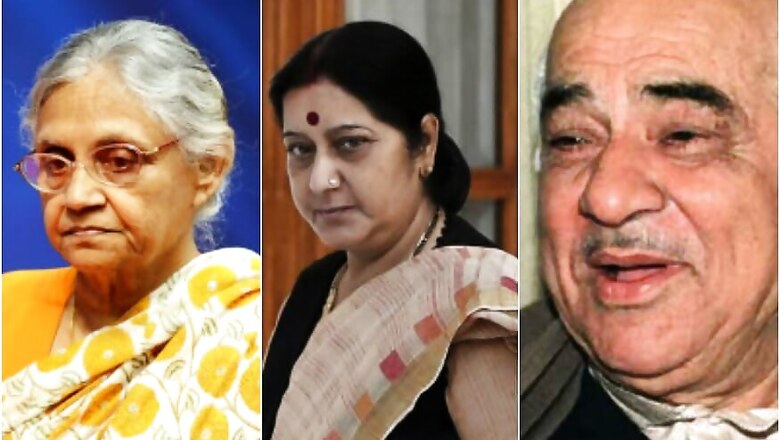
views
New Delhi: It is no surprise that elections in Delhi are a newsmaker in every sense of the word. The polls have propelled political careers into success, deeming them a make-or-break battle for many who are deemed worthy in the first place. While also accounting for the clear shift in city politics with the changing demography of the region: from caste to class politics.
However, in the upcoming 2020 Assembly elections on February 8, many stalwarts of the Congress and the BJP, who witnessed the transition of Delhi politics and held control of the corridors of power, will be absent. It is for the first time that Delhi will witness a contest between the agendas of development and divide minus the legacy of former chief ministers or tall political leaders. This time it is a straight battle between the Aam Aadmi Party’s (AAP) Arvind Kejriwal and the BJP's Manoj Tiwari.
Sheila Dixit
The death of one of the longest serving chief ministers of Delhi, Sheila Dixit, on July 20 last year was perhaps the most recent crisis of leadership for the Congress party. She held the office and led the grand old party to power for three consecutive terms, losing only to Kejriwal in the 2013 elections after a journey riddled with news-making controversies.
Dixit’s political career at the turn of the previous decade was soaked in bad talk around the 2010 Commonwealth Games (CWG) scam, the Shunglu Committee report on appointments across state departments, failure of the Bus Rapid Transit (BRT) corridor, and crimes against women, especially the December 16, 2012 Nirbhaya gang rape and murder.
Handpicked by former Prime Minister Rajiv Gandhi for his council of ministers in 1984, Dixit grew within the party ranks and assumed power over the decades – serving both the interests of the party and the development work. She was the India representative at the United National Commission on Status of Women and served as Union minister between 1985 and 1989.
It was her defeat at the hands of the BJP’s Lal Bihari Tiwari in East Delhi constituency in the 1998 Parliamentary elections that made Dixit contest the Assembly elections later that year. She represented the Gole Market Assembly constituency until the end.
Sahib Singh Verma
The Congress’s victory in 1998 arrived with the departure of Sahib Singh Verma from the office of Delhi chief minister. A former BJP vice-president, Verma served as chief minister between 1996 and 1998, replacing another BJP CM Madan Lal Khurana who was involved in a corruption case.
Quite like Dixit, Verma also made his way up in politics but his career took a downturn after corruption charges and infighting, especially with Khurana. A popular news magazine from that time described the “continuance” of Verma as chief minister as a “matter of concern for the BJP”.
Verma started his career in 1977 as Councillor in the Municipal Corporation of Delhi (MCD), later rising within the ranks to become the Education and Development Minister of Delhi in 1993.
Only after the spiralling prices of onion in the national capital, which crossed the Rs 70/kg in September 1998, was the BJP leadership forced to replace Verma with the then Union Minister Sushma Swaraj. He died in a road accident in Rajasthan in 2007.
Sushma Swaraj
As the first woman chief minister of Delhi who came to rescue the BJP during a crisis, Sushma Swaraj left an indelible mark on city politics and governance in just a 50-day stint. A lawyer by profession, she began her political career with the Akhil Bharatiya Vidyarthi Parishad (ABVP) in the 1970s and was first elected from the Ambala Cantonment Assembly seat in Haryana at the age of 25.
Political commentators have often described her death as the end of caste factor in Delhi elections. Swaraj had held reins in Delhi during a period of instability after it became a state in 1992. That at some point the Punjabis, Jats and Brahmins dominated the political landscape of Delhi while today it is the migrants or the Poorvanchalis has a lot to say about the nature of leadership in the national capital.
The BJP’s choice of Swaraj in 1998 was not a popular one, but it did cut across all sections of voters, surveys conducted by the Centre for the Study of Developing Societies (CSDS) had found.
Madan Lal Khurana
Madan Lal Khurana was the first BJP chief minister of Delhi and is often credited for reviving the saffron party in the national capital with an overwhelming support of Punjabis who dominated the political landscape during that time. He was chief minister from 1993 until he resigned in 1996 due to corruption charges.
In his youth, Khurana founded the Delhi chapter of the Jana Sangh, which ultimately became the BJP unit of Delhi in 1980. During this period, the former chief minister held a number of posts in Municipality and Metropolitan Council elections. He was elected Chief Whip, Executive Councillor and Leader of Opposition, among others.
Khurana, along with Kidar Nath Sahani and Vijay Kumar Malhotra, are credited with keeping the BJP afloat in Delhi for many years.
Other leaders
LK Advani, the former deputy prime minister and one of the founding members of the BJP, has always had a strong presence and influence in Delhi politics. During the days of the Jana Sangh, when the BJP was still far from its conception in 1980, Advani had moved to the national capital in 1957 to look after the parliamentary affairs of his erstwhile party. Only within a span of 10 years, in 1967, he became the leader of the city’s Metropolitan Council.
In 1970, Advani firmed his grip over Delhi politics by becoming a member of the Rajya Sabha from Delhi for the next six years. In 1989, he was elected to the 9th Lok Sabha, his first time in the Upper House, from the capital.
Other illustrious leaders of the BJP who strived hard to maintain the party’s significance in Delhi are Vijay Kumar Malhotra, a former party strongman in the Metropolitan Council; Kidar Nath Sahani, former Mayor of Delhi and chief executive of the Council; and Mangeram Garg, MLA from Wazirpur constituency, among others.


















Comments
0 comment